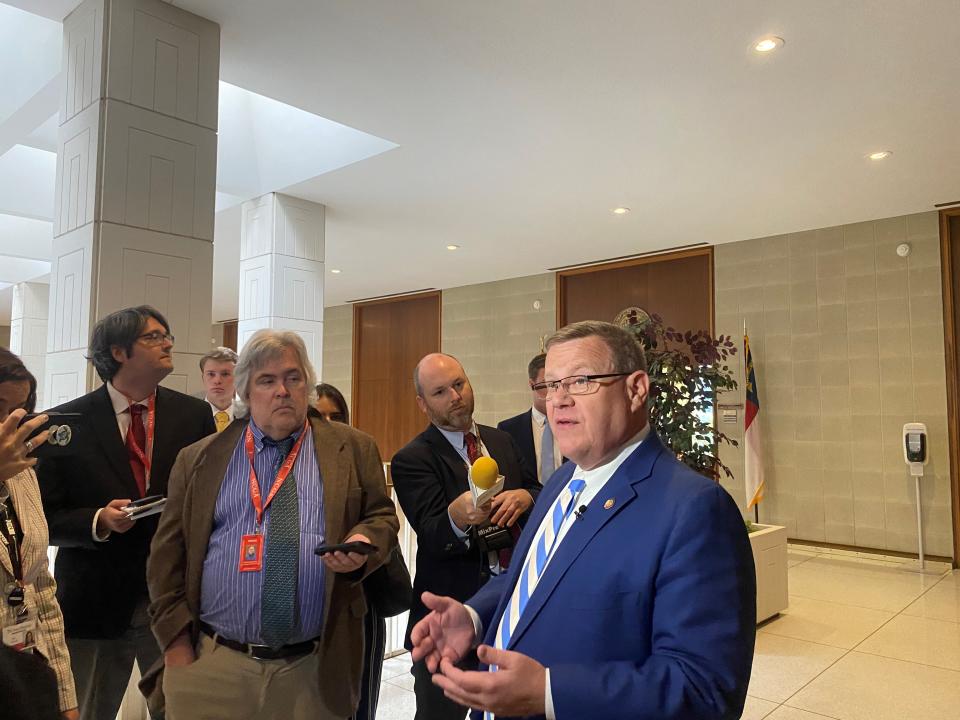NC legislature at impasse on budget updates; teacher raises at stake
- Oops!Something went wrong.Please try again later.
- Oops!Something went wrong.Please try again later.
Additional teacher raises and millions more in funding for the Opportunity Scholarship are on hold as the North Carolina House and Senate navigate a difference of opinions on the short session’s budget updates.
The primary reason for legislators returning to Raleigh this April for the short session was to pass budget updates, but after about two months of work, progress is looking murky with two opposing budget bills from the House and the Senate.
Budget adjustment talks kicked off in late April when Gov. Roy Cooper released his proposal that accounted for a $1 billion surplus. His priorities were mainly in funding public schools, raising teacher pay and increasing childcare funding.
Governor's budget proposal: Gov. Cooper lays out budget proposal as legislature reconvenes. Here are the highlights.
He called for an 8.5% teacher pay increase, much higher than the average 3% raise outlined in the General Assembly's budget passed last session for state employees.
Cooper said the General Assembly had a choice to make: Fund private school vouchers under the Opportunity Scholarship or fully fund public schools, saying it would be tough to do both.
But the General Assembly hasn’t made a decision yet.

Competing House, Senate budget bills
The House passed a budget proposal, HB 263, with a 68-36 vote last week that immediately caused concern among House Democrats for its small teacher pay raise (an average 4.4% raise), full funding for the Opportunity Scholarship and for the speedy manner in which it was taken up.
The budget “invests a lot of the surplus in things that are very much needed like Opportunity Scholarships, more investment in public education with raises, additional raises for teachers, for state employees,” House Speaker Tim Moore, R-Cleveland, Rutherford, said last week.
Rep. Lindsey Prather, D-Buncombe, called the funds appropriated for the Opportunity Scholarship “unconscionable.”
Prather was hoping for teacher raises closer to 8.5% like what the governor proposed.
She said that when the state fails to give teachers raises, the burden often falls on county governments to fill in the gaps, which can lead to higher property taxes.
Budget talks: NC Senate approves millions more for opportunity scholarship, Democrats push back
Prather also took issue with the process of the budget, which was voted on in committee the morning after it was released the prior evening.
“Not only have we not had enough time to read and look into it, but more importantly our constituents and voters have not had enough time to look at it,” Prather said.
Instead of taking up the passed House budget bill, the Senate passed their own on Monday night in a 27-19 vote, with less overall spending and no additional teacher and state employee pay raises while they agreed on fully funding the Opportunity Scholarship, which would cost an additional $463 million to clear the waitlist.
Moore said last week the House would not take up the Senate’s budget bill, leaving the chambers in a sticky tug of war.

Senate President Pro Tempore Phil Berger, R-Guilford, Rockingham, said his main concern with the House's proposal is the total spending.
Moore said there’s only about a $30 million difference between the chambers' budgets. Berger disagreed, saying it was a $523.8 million difference in total and a $312 million difference in new spending.
The House needs to “get serious about the spending number” and then the Senate will engage with them, Berger told reporters.
What happens next?
The legislature passed a two-year budget plan last session, which would cover the upcoming year even if they fail to pass a budget update this short session.
It’s possible, Moore and Berger agreed, that the legislature adjourns for the summer without passing anything.
“There’s no need to just stay here and try to force something that's not going to happen,” Moore said.
It’s also possible for the chambers to re-convene later in the summer or in the fall to pass a budget. The House intends to take a break for the first few weeks of July and Berger said the Senate will likely only hold no vote sessions after this week.
It's a “relatively low-pressure situation,” Moore said because of the two-year budget already in place.
Berger agreed.
"I think the provisions that we have in that budget adjustment bill are things that would be nice to have," Berger told reporters after the Monday night vote. "I don't think they're necessary for the state to continue on a good trajectory."
For the legislature to officially adjourn for the summer, they have to either agree on a budget or agree to not pass one.
This article originally appeared on Wilmington StarNews: North Carolina legislature can't agree on an updated budget bill

